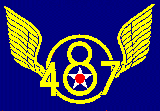 |
|
 |
|---|
[Tim Erskine's note: This page was sent to me by a man who, like me, is the son of a 487th veteran. I present it here as it was sent to me. Enjoy.]
My Fatherís Story:
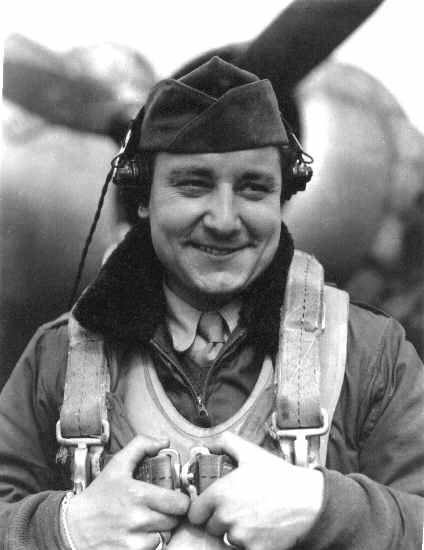
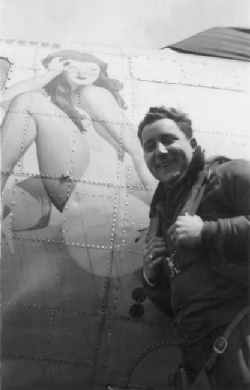
This is a story about the wartime experiences of my father, Sabatine Joseph Branco, who was a Technical Sergeant in the 839th Bomb Squadron, 487th Bomb Group, 4th Air Wing, 3rd Division, 8th Air Force, in the European Theater during WW II. He was a Radio Operator / Gunner (ROG) on a B-17G crew based at Station 137 in Lavenham, Suffolk, England.
Suffolk, England is far away from Camden, NJ where Dad was born in 1923. This story really begins, however on December 7th, 1942, when, in the middle of his freshman year at Temple University, Dad and others in his class enlisted in the USAAF. Reviewing his records, I was surprised at how much training he received. He went through extensive training all across the country, in such places as Fenn College (Cleveland OH), Aviation Cadet Center (Yuma AZ), MacDill Field (Tampa FL), Hunter Field (GA), and Camp Kilmer (NJ). He deployed to Station 137, Lavenham, England on 14-Dec-1944. Dad put in 34 combat missions over target from January 8th, 1945 to April 21, 1945, most of them in a B-17G named "Dinah-Mite" (tail # 48694)
After the war, he returned to New Jersey, completed his degree in psychology and worked in contracting and marketing for 34 years with the RCA Corporation, before setting out to enjoy retired life. In all that time, Dad never wore his veteran status "on his sleeve", but was always willing to talk at length about his experiences when asked.
He told me of the rigors and travails of flying an unpressurized combat aircraft on 10+ hour missions on oxygen and in deep cold; of having to plug into portable O2 bottles to move between stations and frequent intercom check-ins to make sure no one was unconscious; and of electrically heated suits and metal so cold you didnít touch it with bare skin for fear of sticking to it.
Dad described the power and beauty of an armada of hundreds of gleaming aluminum B-17s streaming four contrails (which unfortunately made them more visible to the flak batteries and fighters). He told me of being swarmed by ME-109s and FW-190s, and even occasionally seeing ME-262s and ME-163s (which he did not consider much of a threat due to their speed and limited duration). The crew was always relieved to have P-51 escorts, which they referred to as "our little friends", to fend off the German fighters. Dad seemed to have more fear of the deadly anti-aircraft flak than the enemy fighters, which he described as often being so thick you could "get out and walk on it". He took to sitting on a flak jacket after he saw another ROG taken off a Ď17 with flak shrapnel in his buttocks. Although he did not receive a purple heart, his hearing was damaged by a flak burst that exploded just below the plane as he was checking the bomb bay after the "toggle", and he saved as a "souvenir" a piece of flak that lodged in the fuselage after narrowly missing him.
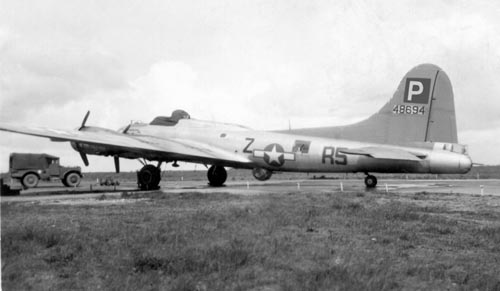
He explained, from first hand experience, the dangers of taking damage and not being able to stay in formation, since the German fighters would pounce all over stragglers. On three occasions, Dadís plane was so heavily damaged that they had to drop out of formation, and was not able to make it back to base (with the crew tossing out anything they could to maintain altitude). Once they sustained so much battle and crash damage that the plane was beyond repair and they got a new one (Ď694). His crew had a pact whereby they would never bail out if someone was stuck in the plane (i.e.: ball turret), and would all ride it down together. They were instructed that if they went down, and could not evade capture, to not trust the French civilians, and that they would be better treated by the Luftwaffe than other German forces.
He described the horror of watching Ď17s take flak blasts or rounds from fighters and burst into flame, split apart, or go into a literal "death spiral". He and the crew could do nothing but watch and pray for chutes. Or returning to base and waiting for planes that didnít return, hoping they had diverted to another airfield. Sometimes he didnít know the planeís crew, sometimes they were friends he had breakfast with. There was a feeling a loss in either case, but also thanks that it wasnít him - anybodyís number could be up anytime. After a mission they would count the bullet and shrapnel holes in the planeís skin, and the ground crew would go to work and have the plane ready for the next dayís "maximum effort" mission. A couple of times when his plane wasnít ready, they took another plane or he filled in for a missing man in another crew. Even the ground crews were not free from danger - Dad once saw a man back into a spinning prop.
Dad also told me about exploring England on leave.
He thought the British were great, especially considering what hardships
they endured (he heard or saw V-1s and V-2s trying to hit the airfields
or British cities) and how much they appreciated the "Yanks", referring
to them as "our Boys". He would take some of his rations with him on these
trips, especially chocolate and candy, and give it to children who otherwise
could not get such luxuries (the 487th was evidently well supplied compared
to British civilians). At the pubs, the Yanks would buy rounds for the
locals, and the innkeeps would keep some of the bitters and ales cold for
the Yanks.
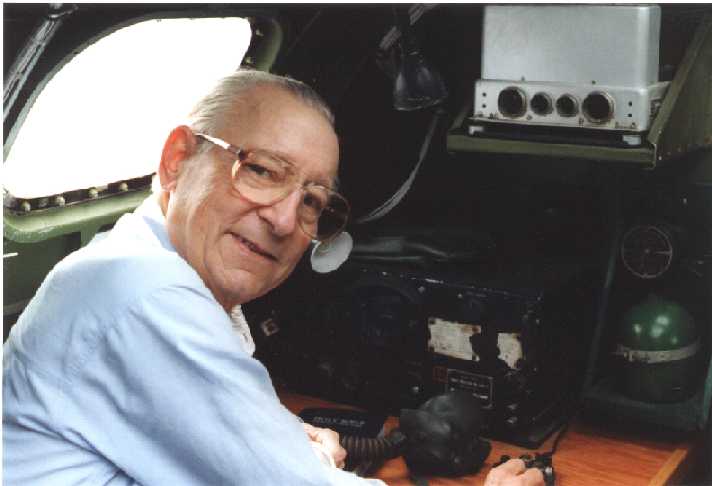
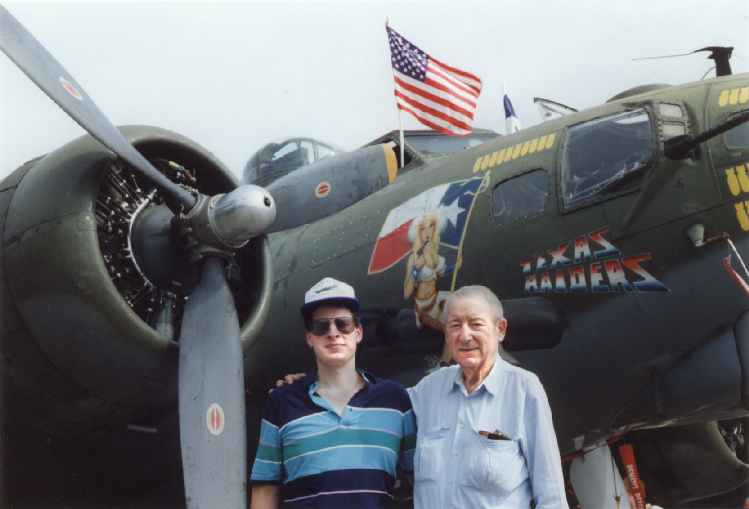
A few years ago, I was able to take Dad to see a beautifully restored B-17G (the Confederate Air Forceís "Texas Raiders") which flew into a nearby airfield. Dad wasnít in the best of health, but we went through the plane, and he sat at his old radio station, grinning ear-to-ear. He even manned the waist gun as he described targeting a leading "pursuit curve" on enemy fighters. I was amazed that a crew of 10 men could fit in the plane, even without the heavy flight gear (insulated suits, flak jackets, and chutes). Dad really enjoyed seeing an example of an old friend that had brought him back time after time against seemingly impossible odds. He got to talk to other veterans and they shared their experiences with members of curious younger generations, who I hope appreciated what an honor and privilege it was to experience the living history embodied in these men and machines.
Sometimes there is a tendency to romanticize the adventure and exploits of combat aviators, the "Cowboys of the Air". They were after all, just 19 year-old kids, transferred all over the US for training, then shipped to Europe on cruise liners and liberty ships. Once there, they mastered some of the most advanced technology of the time, and applied it in frightening conditions to bring the fight to Hitler. I understand that serving in the armed forces was a great and patriotic duty, to fight for a free and democratic society when the forces of fascism presented a real threat for world domination, but Iíll never forget that this was deadly serious business. I often wonder if I would have had the courage and guts to enlist, or go back mission after mission knowing that the law of probability was catching up, like playing Russian Roulette.
Sabatine Joseph Branco is a hero to me, as are the other veterans of his generation. I stand in awe of their sacrifices and achievements, and all succeeding generations owe them an eternal debt of gratitude and reverence.
Richard G. Branco
09-Feb-1998